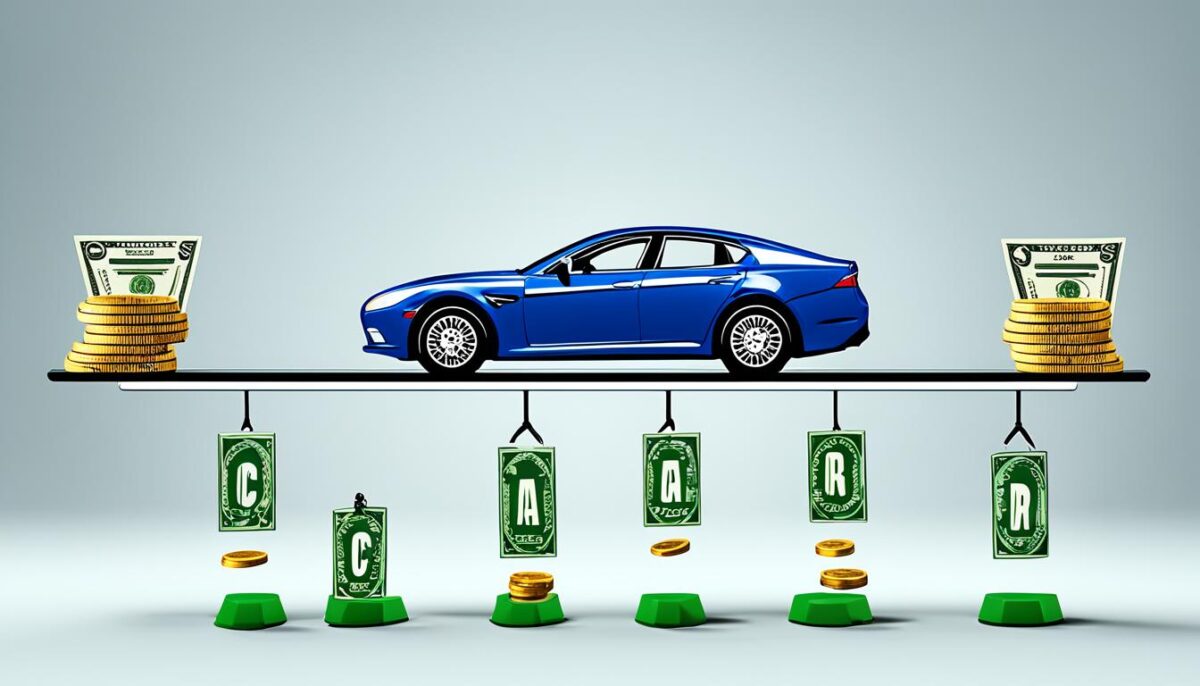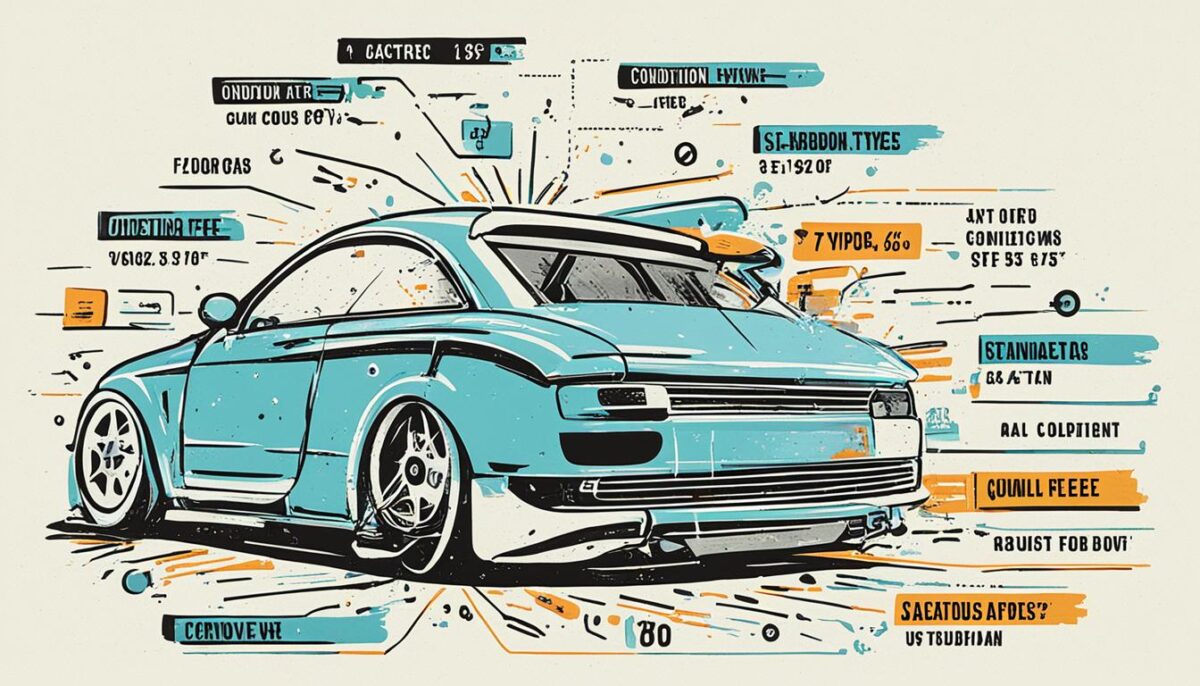Welcome to our comprehensive guide on car auction fees. In this section, we will take a deep dive into the various costs and factors involved in purchasing a vehicle at an auction. Whether you’re a first-time buyer or a seasoned bidder, understanding car auction fees is essential in making informed decisions and managing your budget effectively.
When it comes to car auction fees, there are several aspects to consider. The costs can vary depending on factors such as the type of auction, the location, and the condition of the vehicle. By exploring these different factors, we aim to provide you with a clear understanding of how much you can expect to pay in fees when buying a car at an auction.
Buying a vehicle at an auction can offer exciting opportunities and potential cost savings. However, it’s crucial to be aware of the fees involved to avoid any surprises. That’s why we have put together this guide to help you navigate the world of car auction fees and make the best-informed decisions.
Join us in the following sections as we break down the different types of auction fees, discuss the factors that can affect these costs, and provide practical tips on managing car auction fees. By the end of this guide, you’ll be equipped with the knowledge and insights to confidently participate in car auctions and make the most of your buying experience.
Understanding Car Auction Fees
When venturing into the world of car auctions, it’s essential to have a clear understanding of the fees involved. Car auction fees can vary depending on several factors, and knowing what to expect will help you budget effectively and make informed purchasing decisions.
Car auction fees typically encompass various charges that buyers encounter throughout the buying process. These fees can include buyer’s fees, seller’s fees, registration fees, documentation fees, and transportation fees. Each fee serves a specific purpose and contributes to the overall cost of the vehicle.
The buyer’s fee is one of the most common fees you’ll encounter at a car auction. It is usually a percentage of the final sale price and can range from 5% to 10% or more. This fee covers the auction house’s administrative costs and profit. It’s important to factor in this fee when setting your budget to avoid any surprises.
Seller’s fees are typically charged to the party selling the vehicle. These fees can vary depending on the auction house and can be a flat rate or a percentage of the final sale price. If you’re consigning a vehicle to be sold at an auction, make sure to inquire about the seller’s fees beforehand.
Registration fees are another expense to consider when participating in a car auction. These fees cover the cost of registering as a bidder and are usually a one-time payment. The amount can vary depending on the auction house and may also include a bidder identification card.
Documentation fees, also known as processing fees, cover the paperwork involved in transferring ownership of the vehicle. These fees can range from a few dollars to several hundred dollars, depending on the auction house. It’s important to review the terms and conditions of the auction before bidding to understand the documentation fees.
Transportation fees are applicable if you need to transport the purchased vehicle. These fees vary based on the distance, the type of vehicle, and the transportation method. If you are unable to transport the vehicle yourself, it’s crucial to factor these fees into your budget.
In addition to the standard auction fees, it’s important to consider any potential additional costs. These costs may include inspection fees, vehicle history reports, and potential repairs or maintenance. Conducting thorough research and inspections before the auction can give you a better understanding of the vehicle’s condition and any associated costs.
To illustrate the different car auction fees involved, here’s a visual breakdown:
| Fee Type | Description |
|---|---|
| Buyer’s Fee | The fee charged to the buyer for administrative costs and profit. |
| Seller’s Fee | The fee charged to the seller for listing and selling the vehicle at the auction. |
| Registration Fee | The fee paid by bidders to register and participate in the auction. |
| Documentation Fee | The fee covering the paperwork involved in transferring ownership. |
| Transportation Fee | The fee incurred for transporting the purchased vehicle. |
Understanding car auction fees is crucial for buyers to plan and budget accordingly. By knowing what fees to expect and taking them into account, you can make informed decisions and avoid any surprises during the buying process.

Factors Affecting Car Auction Fees
When participating in a car auction, it’s crucial to understand the various factors affecting car auction fees. These factors can significantly influence the final amount you’ll pay to acquire your desired vehicle. By taking these variables into account, you can better prepare and estimate the potential fees that may arise during the auction process.
The type of auction is a primary determinant of the fees involved. Auctions can be categorized as traditional, online, or government auctions, and each type may have different fee structures. Traditional auctions often charge registration fees and bidder premiums, while online auctions may have additional fees related to online bidding platforms or third-party services.
Location also plays a crucial role in determining the fees you’ll encounter. Different areas may have varying tax rates, surcharges, or local auction regulations that can significantly impact the final fees. Consider researching and comparing auctions in different locations to find those with more favorable fee structures.
The condition of the vehicle is another crucial factor affecting auction fees. Vehicles in better condition generally attract higher auction fees due to their increased desirability. It’s important to assess and inspect the vehicle thoroughly before bidding to avoid any unforeseen costs related to repairs or additional fees associated with the vehicle’s condition.
Furthermore, additional services or add-ons that you choose can affect auction fees. These may include transportation services, vehicle history reports, extended warranties, or any other extras offered by the auction house. It’s essential to weigh the necessity and cost-effectiveness of these services against their respective fees before opting for them.
By understanding these core factors affecting car auction fees – the type of auction, location, vehicle condition, and additional services – you can better navigate the auction process. Doing thorough research, conducting inspections, and considering the potential fees will ultimately enable you to make informed decisions and avoid any unexpected financial surprises.

| Factors | Affecting Car Auction Fees |
|---|---|
| Type of Auction | Traditional, Online, Government |
| Location | Tax rates, Surcharges, Local regulations |
| Vehicle Condition | Repair costs, Additional fees |
| Additional Services | Transportation, History reports, Warranties |
Tips for Managing Car Auction Fees
When it comes to buying a vehicle at a car auction, managing the associated fees is crucial. To help you navigate this process, we have compiled some practical tips and advice to effectively manage car auction fees.
Firstly, creating a budget is essential. Determine how much you are willing to spend on the vehicle itself, and allocate a separate amount for potential fees. This will ensure that you have a clear understanding of your financial limits and can prevent any unexpected financial strain.
Researching auction houses is also vital. Different auction houses may have varying fee structures, so it’s important to gather information on their policies and charges. Take the time to compare and choose auction houses that align with your budget and requirements.
Negotiating fees is another useful strategy. Don’t be afraid to ask if there is any room for negotiation, especially for larger fees. Auction houses may be open to adjusting their charges, particularly if you are a serious bidder or a repeat customer.
Finally, it’s essential to understand any potential hidden costs. Some auction fees may not be immediately apparent, such as buyer’s premiums or administrative charges. Thoroughly read the terms and conditions provided by the auction house to ensure you are aware of all the possible fees involved.
By following these tips, you can effectively manage car auction fees and minimize any unexpected costs. With careful planning, budgeting, and research, you can confidently participate in car auctions and make informed decisions that align with your financial goals.

